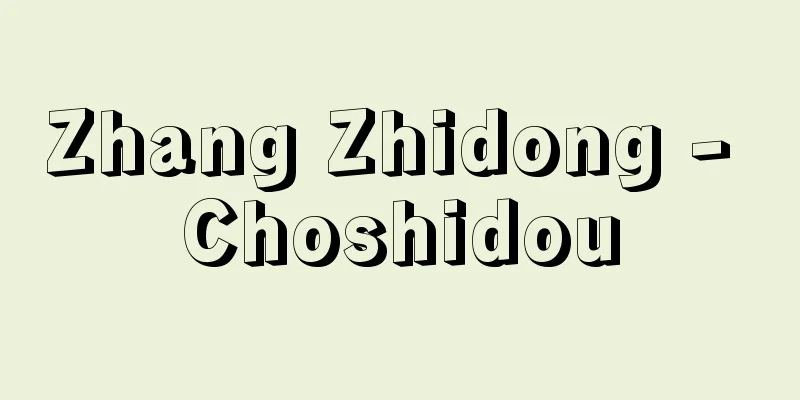Zhang Zhidong - Choshidou

|
A leading Chinese bureaucrat in the late Qing Dynasty, and one of the promoters of the Westernization Movement. His pen name was Xiaoda. His pen names were Wujiang Jushi and Hugong Baobing. He was from Nanpi, Zhili (Hebei) Province. He was a diligent student from an early age, highly regarded as a gifted scholar, and rose through the ranks quickly. He served as a scholar of the Hanlin Academy, a cabinet minister, governor of Shanxi, governor of Liangguang, governor of Huguang, and governor of Liangjiang. During this time, he actively promoted the Westernization Movement alongside Li Hongzhang and Zuo Zongtang, and worked to strengthen the military, establish government-run factories, reform education, develop human resources by sending students abroad, and promote practical learning, becoming one of the leading figures in the later stages of the Westernization Movement. In 1898, he wrote "Encouraging Learning" in which he advocated the "Chinese body, Western use" theory, and, based on the premise of the existing dynastic system, sought to "enrich the country and strengthen the military" as much as possible under that system in a desperate attempt to revive the Qing dynasty. This is considered to be the theory that represents the Westernization Movement, but as can be seen from the time this work was written, it also contained the intention of defending the Westernization Movement against the rise of the Reform Movement. [Akio Ito] Nishi Junzo (ed.), "Original History of Modern Chinese Thought 2" (1977, Iwanami Shoten) Source: Shogakukan Encyclopedia Nipponica About Encyclopedia Nipponica Information | Legend |
|
中国、清(しん)末の大官僚で、洋務運動推進者の1人。字(あざな)は孝達。号は無競居士、壺公抱冰(ここうほうひょう)。直隷(ちょくれい)(河北)省南皮出身。幼少時から勉強熱心で、秀才の誉れが高く、出世も早かった。翰林院(かんりんいん)侍読学士、内閣学士から山西巡撫(じゅんぶ)、両広総督、湖広総督、両江総督などを歴任、その間、李鴻章(りこうしょう)、左宗棠(さそうとう)などと並んで、洋務運動を積極的に推進し、軍備強化と官営工場の設立、教育改革、留学生派遣による人材育成、実学振興に努め、洋務運動の後期の代表者の1人となった。彼は1898年に『勧学篇(へん)』を書いて「中体西用」論を主張し、既存の王朝体制を前提として、その下で可能な限り「富国強兵」を行い、清朝の起死回生を図った。これは洋務運動を代表する理論とみなされているが、この著作の書かれた時期をみてもわかるように、変法運動の興隆に対して、洋務運動を擁護しようとする意図をも含んでいた。 [伊東昭雄] 『西順蔵編『原典中国近代思想史2』(1977・岩波書店)』 出典 小学館 日本大百科全書(ニッポニカ)日本大百科全書(ニッポニカ)について 情報 | 凡例 |
<<: Chojagahara ruins - Chojagahara ruins
Recommend
Indictment - Kisojo
A formal document prepared by a public prosecutor ...
Sphyrna lewini (English spelling) Sphyrnalewini
…Shark [Toru Taniuchi]. . . *Some of the terminol...
Myrmecodia tuburosa (English name) Myrmecodia tuburosa
...It is said that in return for providing a home...
Gastric cavity - Let's go
〘Noun〙① A cavity in the center of a sponge's b...
Asano Zaibatsu
A conglomerate built by Soichiro Asano in one gen...
Kawarayu [Hot spring] - Kawarayu
A hot spring located in the Agatsuma Valley in the...
Yatsuhashi-ryu
The name of a school of koto music. (1) It is used...
Superplasticity
…Under certain conditions, a material can undergo...
Galileo Satellites - Galileo Asay
Galilean satellites : Jupiter's four major moo...
《Gyoran Kannon》
…His early works were particularly outstanding, a...
Hajime Sugiyama
Army officer. Born in Fukuoka Prefecture on Janua...
Hartford, JH (English spelling) HartfordJH
…In 1963, the company was named Great American Te...
Mr. Doi
A feudal lord in the early modern period. Fudai. S...
Notodelphyoides
...They live in wetlands, mostly benthic, but the...
spontaneous pneumothorax
...Pneumothorax occurs secondary to these underly...









